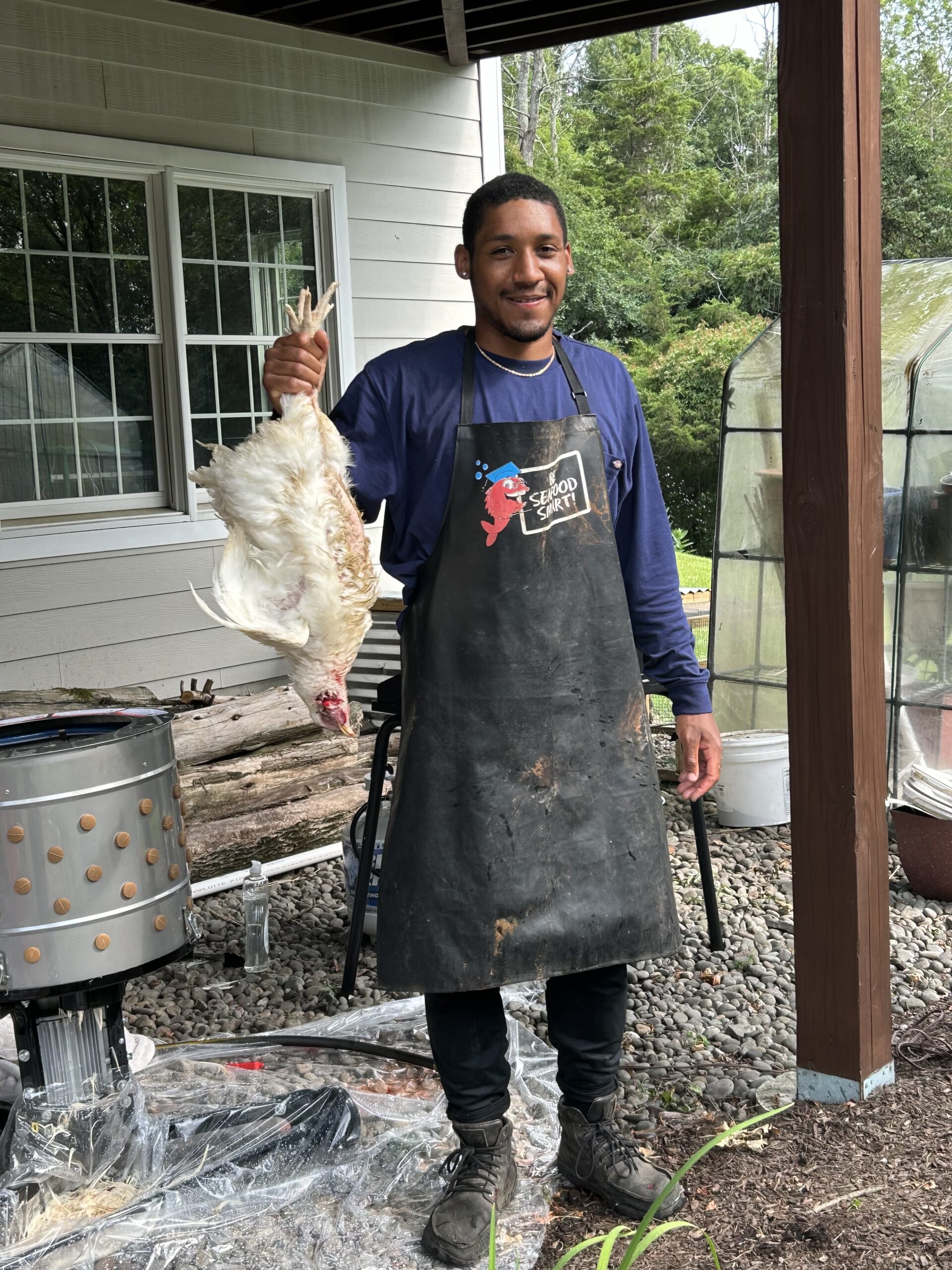The way I view and live my life is holistic and big picture and I do my best to translate that into the little picture.
So the reason I raised my meat chickens is for the three reasons
- Because I can
- Creativity for its own sake
- I value high-quality, organic food
I’m pretty sure we all know that the things you grow and raise yourself are 100x better than anything you’ll get at the grocery store. The love, commitment, consciousness, and patience that goes into something of quality is well worth it.
By no means was it easy and I was doing it with minimal funds but I made it through and throughout the process, I had a lot of help from friends, family, and the internet. I also have laying hens so I’m not a complete newbie.
I took a homesteading course in person while I was raising the birds and the woman who ran it had a lot of experience in this area. So I guess I got a little lucky.
The Process
I ordered 15 Cornish crosses and 3 of them died along the way. 2 as babies and 1 from the suffocating New York humidity.
The reason I chose Cornish Crosses is because in my opinion you can’t beat the 8-10 week turnover rate and they taste good.

I raised them from May to the beginning of July for a total of 9 weeks.
I put them in a chicken tractor I built from the YouTube channel called Sow The Land. They’re awesome. It was big enough to fit 15 chickens.
The property I live on is a mountain so having a small mobile chicken tractor worked perfectly and I moved them to fresh grass daily.
For the first 3 weeks before I moved them outside I fed them corn and soy-free organic starter feed and once they were outside on grass full time I fed them organic, soy-free layer crumbles. I did organic layer crumbles instead of broiler because it’s the best price I could find.
There were a couple of times a hawk would land on the chicken tractor but the tractor is very secure so I didn’t have to worry about predators at all except for shooing away the hawk.
The only times I would let them run around freely was when I was outside doing work in the garden. Other than that I wasn’t going to risk free-ranging them. Cornish Crosses are lazy anyways.
Once they were outside all I had to do was be patient and keep the routine of food, water, and moving the coop.

The Butchering
Now for the fun part and right off the bat, I’ll say that the setup and clean up is what takes a long time, not the actual processing of the birds.
24 hours before they were processed I gave them no food and put them in a big dog crate in the basement so that they had no chance of eating anything. I gave them water freely.
At this point, I was scrambling around writing notes, and preparing for the morning. Now I worked as a butcher for 2 years but killing a chicken is not the same as splitting a Perdue pre-packaged oven roaster in half. So I was nervous.
I woke up at about 5 a.m. the next morning to set everything up and prepare. I had a sharp boning knife, cleaver, killing cones, scalding water, plucker, evisceration table, and ice water baths with salt.
I think it’s crucial to be in the right state of mind and to be calm when doing something like this so I made sure the morning was as stress-free as possible.
Before I began I said a little prayer and got into the arena.
After the first 3 birds or so I started getting the hang of it and got into a flow state.


Once you smell chicken blood the smell never leaves your nose.
Processing animals truly is an art form. You turn a living thing into something appealing and nourishing.
After all the chickens were processed and in an ice bath for about 2 hours I put them in the fridge for 24 hours so they could age and tenderize.
It took me from 7 in the morning to 4 in the afternoon to set up, process, then clean up.
I also did this on the fourth of July so family came over when I was doing it.
After 24 hours in the fridge, I weighed and vacuum-sealed them and threw them in the freezer.


At the end of it all my family made a delicious dinner with it. Does it get any better?

Mistakes
Mistakes are inevitable in all endeavors and here are some I made.
I felt like I didn’t diversify their diets enough. Diversity in the diet starts at a young age so I would’ve given them more kitchen scraps and weeds from the start.
In the tractor, it was difficult for them to dig up the dirt to take dust baths so I would put a container in there with diatomaceous earth or dig a hole for them.
Other than that I’d say I did pretty good for my first time.
Conclusion
The chickens I produce are delicious, tender, and better than anything you’ll get at the grocery store.
I highly recommend that everyone tries this at least once in their life. Because to me humans should be able to do many different things in a diverse array of areas. In the famous words of Robert Heinlein, “specialization is for insects.”

